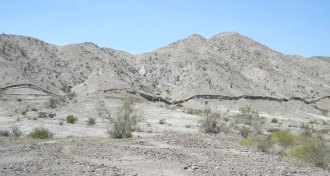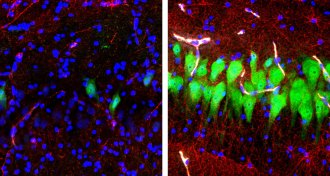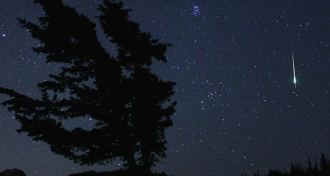News
-
 Humans
HumansMedicaid expansion may help shrink health gaps between black and white babies
States that expanded Medicaid as part of the Affordable Care Act shrunk racial disparities between black and white infants, a new study shows.
By Sujata Gupta -
 Physics
PhysicsThe M87 black hole image showed the best way to measure black hole masses
The first image of M87’s black hole suggests it is 6.5 billion times the mass of the sun — close to what was expected based on how stars move around it.
-
 Neuroscience
NeuroscienceThe herbal supplement kratom comes with risks
The supplement kratom can cause heart racing and agitation.
-
 Earth
EarthMore than a million tiny earthquakes revealed in Southern California
By putting millions of tiny quakes on record, scientists hope to learn more about what triggers the big ones.
-
 Genetics
GeneticsA genetic scorecard could predict your risk of being obese
A genetic score predicts who is at risk of severe obesity, but experts say lifestyle matters more than genes.
-
 Science & Society
Science & SocietyImmigrants pave the way for the gentrification of black neighborhoods
A study using U.S. census data shows primarily Asian and Hispanic immigrants may trigger gentrification in U.S. neighborhoods.
By Sujata Gupta -
 Neuroscience
NeuroscienceDead pig brains bathed in artificial fluid showed signs of cellular life
Four hours after pigs died, the animals’ brain cell activity was restored by a sophisticated artificial system.
-
 Chemistry
ChemistryThe first type of molecule to form in the universe has been seen in space
The chemistry of the universe began with helium hydride. Scientists have just seen it in outer space for the first time.
-
 Science & Society
Science & SocietyStatisticians want to abandon science’s standard measure of ‘significance’
For years, scientists have declared P values of less than 0.05 to be “statistically significant.” Now statisticians are saying the cutoff needs to go.
-
 Planetary Science
Planetary ScienceA 2014 meteor may have come from another solar system
Scientists have identified a possible interstellar meteor, and think it could be one of millions that have visited Earth over the planet’s history.
-
 Health & Medicine
Health & MedicinePeople with stress disorders like PTSD are at higher risk of heart disease
Those coping with psychological trauma have a greater risk for cardiovascular disease, a large-scale study that goes beyond men and veterans finds.
By Maanvi Singh -
 Planetary Science
Planetary ScienceMeteor showers dig up water on the moon
Meteorites release water from the moon’s soil, hinting that the moon has water buried all across its surface.